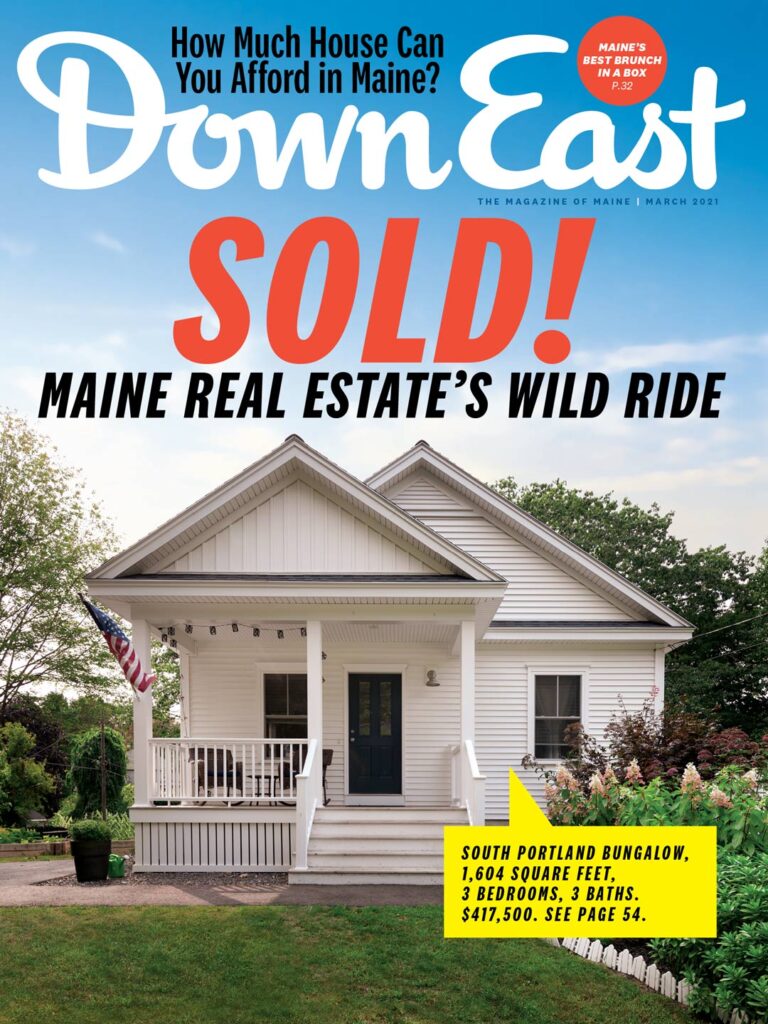Mainers accounted for 66 percent of all single-family home sales last year. Above, a breakdown of the remaining 34 percent. The percentages of purchasers from New York and California saw the biggest gains over 2019.
By Jesse Ellison
The first time I met my closest neighbor after buying my home in Camden, he asked where my parents were born. I stammered that my mom was born in Lewiston and my dad in Connecticut, adding that I was born in Damariscotta. He said it anyway, straight to my face: “Well, you’ll never be a real Mainer.” He said it with a sort of wink, as such people usually do, but it stung nonetheless.
And yet, last spring, in the early days of COVID, I glared uneasily at the New York and New Jersey license plates appearing around my town. Maine had seemed to sail through the first months of the pandemic: most counties had no community transmission until fall; positive cases were minimal compared to most of the rest of the Northeast. It was scary to think what outsiders might bring with them — and I wasn’t alone feeling less than welcoming. After old friends from New Jersey bought a place on the midcoast in March, their car was egged at Hannaford. After that, they registered their other vehicle locally and kept the car with the Jersey plates in their garage. (“It felt shitty, it really did,” my friend said. “But I’ll tell you, people in Jersey loved that story.”)
On another spring day, at yet another Hannaford, I saw an SUV with New York plates and a handmade sign taped to the window that read, “I’ve been here since February!”
In many of Maine’s island communities, early-COVID anxieties about outsiders were even more pronounced. North Haven officials briefly tried to bar anyone from the island who wasn’t a year-round resident. Vinalhaven’s town government sent letters to owners of summer homes requesting they stay away. In March, a group of “local vigilantes,” as Vinalhaven’s state rep called them, made national news after cutting down a tree and dragging it across a road to prevent several New Jersey residents from leaving their rental property.
“Most of us were shocked and horrified,” recalls Kris Davidson, a real estate broker on the island. She spent the next few months fielding calls from worried property owners and would-be renters, some asking if they’d be met with guns coming off the ferry.
“When I saw that, I thought, ‘Oh, I’m surprised that’s not in Lubec,” says Joshua Rolfe, operations supervisor at Washington County’s regional emergency communications center. The far Down East county saw home sales jump by more than a third in the last year, and the influx of out-of-state plates, Rolfe says, was “notable.” All year, he heard stories of people from away (“PFAs,” in some circles) buying houses sight unseen in towns like Jonesport and East Machias.
“The people with those kinds of views tend to be the most vocal, and their voices get carried,” former state economist Charles Colgan says. “But I think it is a decreasing perspective.”
“There was some tension when people showed up in cars with out-of-state plates, because people were so nervous,” says Lehrle Kieffer, a real estate broker in Caribou. Aroostook County tends to be welcoming, she says — still, her son-in-law blanched last year when his workplace in the County gave him a company vehicle with New York plates. “He was appalled,” Kieffer says. “Of all the states!”
Even as quarantine restrictions have lifted and transmission concerns eased, Mainers are left grappling with an age-old wariness about newcomers, particularly any emitting a whiff of expectation that their new home adjust to their wonts. (“The only ones we see that are rejected,” Kieffer says, “are the ones that are too urbanized, too citified. They’re not happy with the lack of amenities.”) Of course, in a small town, even the most adaptable COVID émigrés can place appreciable new demands on things like waste removal, emergency services, and education. In Rangeley, where 2020 home sales were up sharply, enrollment at the K–12 school jumped more than 10 percent last fall — and while rural school districts facing consolidation may welcome such a windfall, teacher shortages and property-tax pinchfists are complicating factors. Meanwhile, spiralling home values and deep-pocketed newcomers can price out locals, putting home ownership out of reach for Mainers with less means and exacerbating an already acute affordable-housing crunch. All of this may leave some Mainers chilly.
And yet, reminds Dr. Charles Colgan, professor emeritus of public policy and planning at the University of Southern Maine, in-migration is desperately needed here. With its stagnant population growth and the highest median age of any state, Colgan says, Maine needs to attract new full-time residents to replace those aging out of the workforce — to say nothing of driving growth. For his part, the former state economist doesn’t worry much about the old antagonism toward PFAs. “The people with those kinds of views tend to be the most vocal, and their voices get carried,” Colgan says. “But I think it is a decreasing perspective.”
For me, I hope all these new neighbors give some of us an opportunity to rethink what it means to be a “real Mainer.” And I’m not the only one who feels that way.
“It’s not about where you’re from — it’s about where you are,” says Nate Wildes, executive director of the nonprofit Live and Work in Maine, launched to help address the state’s crippling labor shortage. “You get no points for being born here. You get points if you move here.” And even more importantly, Wildes says, “if you stay.”
Chart data provided by Maine Listings, a subsidiary of the Maine Association of REALTORS®. Location of buyers as a percentage of all single-family home sales from September through November 2020.




